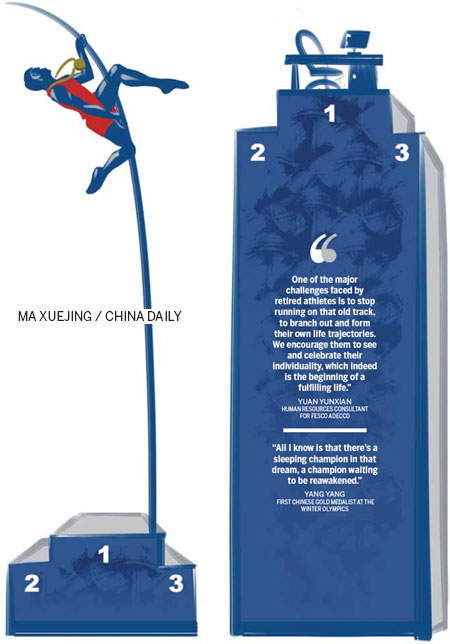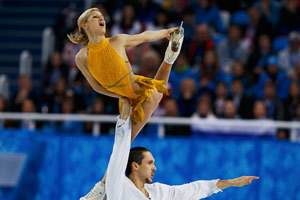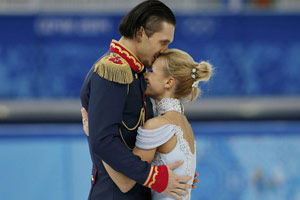Looking for life after glory of victory
Updated: 2014-02-13 09:30
By Zhao Xu (China Daily)
|
|||||||||||
China's first Winter Olympics champion helps athletes in retirement find new directions, reports Zhao Xu in Beijing.
Yang Yang knows how it feels to be bathed in glory. She is the first Chinese athlete to stand on the champions podium at the Winter Olympics, winning two gold medals, two silvers and one bronze for short-track speedskating between 1998 and 2006.
She also knows what it's like to struggle and rediscover her place in the wider world after retirement.
"Believe me, it's quite different from the taste of the medals," she said, gently touching where the gleaming badges of honor once sat silent and proud on her chest.
"All through my youth, I fought for that moment, and, when it finally arrived, I felt that my entire existence had been consummated," she said. "Well, in a sense it was. But in retrospect, that was just the end of the beginning."

Today, Yang Yang is a member of the International Olympic Committee, the first Chinese athlete to make it there. Between the past medals and today's pursuits there's probably a memoir worth penning.
These days, however, the 39-year-old, still exuding the inexhaustible energy of her dominant years, and with the same infectious smile she flashed to packed stadiums, continues to share her abilities.
She does so not only with a world of adoring fans, but in service to athletes whose preparation for life after retirement was somehow given short shrift in their single-minded quest for physical excellence.
Yang, one of China Central Television's expert commentators at the ongoing Sochi Winter Olympics, approaches the problem in typical top-performing style. In 2011, she set up the Beijing-based Champion Foundation, which aims to help fellow retired Chinese athletes find new careers after the bright light of fame dims. For many of them, a gnawing sense of uncertainty about the future characterizes what has become something of a rite of passage - a transformation to a new status as a regular person.
A year ago, as a newly elected member of the IOC, Yang participated in one of its meetings. By then, the IOC had established its own career program for athletes. "A map was shown at the meeting with little black dots indicating its worldwide reach," said Yang. "There's not a single dot in the whole Chinese region."
Thus her idea germinated.
 |
| China Daily in Sochi |
To create channels between the pool of retiring and retired Chinese athletes and potential employers, Yang's foundation joined hands with FESCO Adecco, a joint-venture between the Beijing-headquartered, State-owned Foreign Enterprise Human Resources Service Co and the Swiss human resources company Adecco. The group claims a handful of big-name clients with worldwide reach, including Nike and Decathlon, the French supplier of sports equipment.
"Keeping in mind that, in China, competitive sport is very much a State affair, all we needed to do was convince the authorities that something must be done, and we were up for that," Yang said.
That was relatively easy, thanks equally to the good relationships she has maintained in all the right circles and to the steady stream of media reports over the past decade that painted an all-too-bleak, often heartbreaking, picture of forgotten sports heroes whose hard-won achievements not only didn't spare them from life's hardships but at times seemed to make things worse.
"From time to time, we heard about a repeat Olympian who was forced to part with his or her most cherished collection of medals to cover meager living expenses, or one who had been reduced to accepting less-than-wholesome work -for example, as a public bath scrubber," Yang said. "That was what Zou Chunlan, a national weightlifting champion, did for many years after her retirement in 1993."
The public was duly outraged, and the government was strongly criticized for breaking a promise to take care of its hard-training athletes.
"People kept saying that we deserve this and that merely because of what we've done before. The argument stung me because it diminishes who we are today," Yang said, inhaling deeply. "Without realizing it, they were suggesting that overnight we could turn from assets into liabilities. Sadly, for a very long time this attitude, along with a crippling sense of insecurity that many athletes felt upon retirement, seemed to have been feeding on each other.
"So, all I want to tell them is this: Don't be afraid. You are not starting from scratch."
 |
 |
| Russia wins second gold in figure skating | Highlights of Sochi Winter Olympics, Feb 11 |
Related Stories
Chinese performance at Sochi Winter Olympics, Feb 11 2014-02-12 11:08
Putin wishes China success in Sochi Games 2014-02-12 10:09
Russia wins second gold in figure skating 2014-02-13 04:54
China claims two victories at curling in Sochi 2014-02-12 05:35
Today's Top News
No casualties reported in Xinjiang quake
Embassy in talks over arrest
Abe's view on history rapped
Prostitution crackdown expands in Guangdong
New visa policies a blessing for Chinese travelers
Chinese consume too much food from animals
Beijing low on list of green cities
China to launch major anti-pollution plans
Hot Topics
Lunar probe , China growth forecasts, Emission rules get tougher, China seen through 'colored lens', International board,
Editor's Picks

|

|

|

|

|

|





